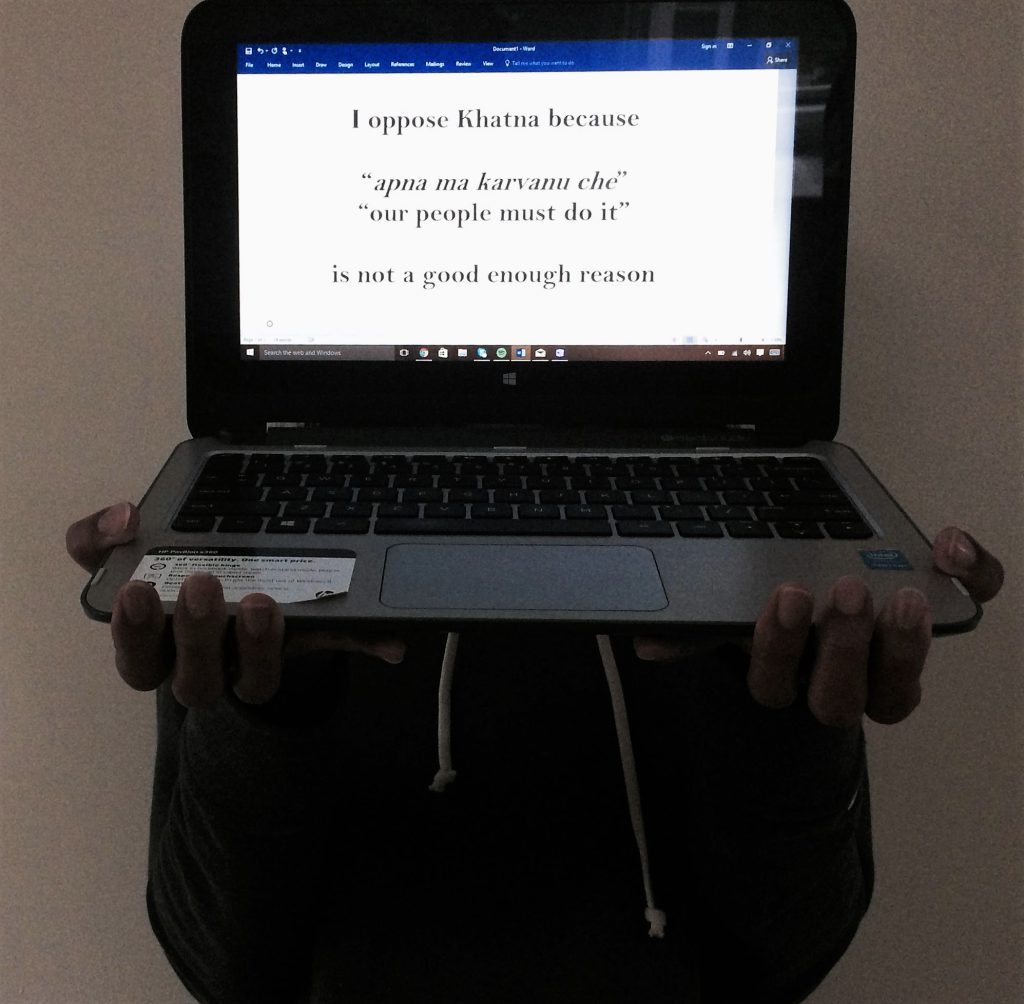I was spared from khatna because my Dadi happened to pass away
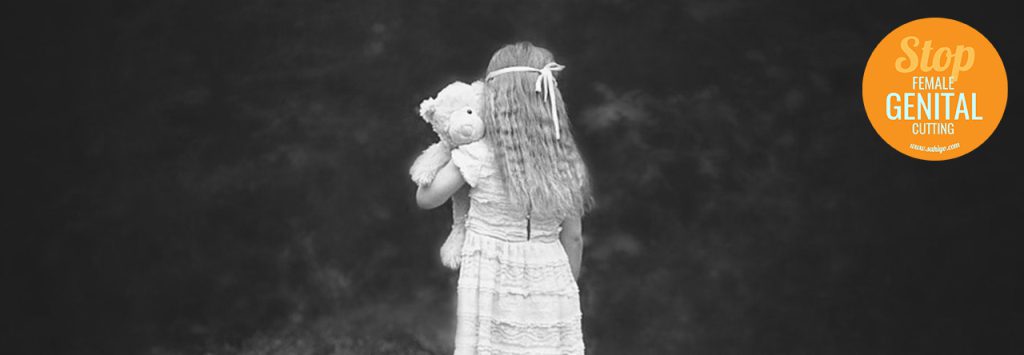
by Anonymous Age: 34 Country: India I came to know about the practice when I was seven years old, but all I knew was that khatna means removing something from your body. My two elder sisters have undergone khatna, but I was not cut. The reason for this is that my dadi (grandmother) passed away before it was my turn to be cut. My parents had got my sisters’ khatna done because of pressure from my dadi – otherwise, they never wanted to perform khatna on any of their daughters. I was in the 7th standard when I first discussed khatna with my mother. After coming from school, I told my mother about a class we had had on sex education, menstruation, puberty and bodily changes. My mom brought up khatna during this talk. She told me it is done to reduce sexual pleasure. Innocently, I asked her, “Mummy, maru pan khatna thavanu chhe?” (Will khatna happen to me also?) She said no, and I was very happy then. One of my sisters has a daughter, but she has decided she will not have khatna performed on her. I do not support this practice either. Such a tradition that harms women’s sexuality and rights should be stopped.
I don’t remember my khatna. But it feels like a violation

(First published on February 23, 2016) Zehra Patwa Age: 45 Country: United States In 2014, I saw a video that changed my life. My husband sat me down, told me that this was going to be upsetting, and showed me a video. It was a documentary from Australia featuring my cousin’s wife recounting her experience of being cut at the age of 7 in a dingy apartment in India by an old woman. Her telling of the story horrified me, which is the same reaction I have always had about Female Genital Mutilation (FGM) but what threw me was the fact that this was a Bohra woman, like me. She said this happens to all Bohra girls around the age of 7 and that it had happened to her sister, too. For a moment, I refused to believe it but as she kept talking, I realized that it could have been done to me too. I grew up in the UK and moved to the US in 1994. I immediately recalled that summer trip to India at the tender age of 7 to attend my uncle’s wedding. My mother had made me new dresses and I had matching hats and headpieces to go with them. It was going to be so much fun. What I couldn’t recall, though, was the actual khatna, but I have since received confirmation from my family that it was done to me. Even then, the reality did not sink in. How could I not remember it? Maybe it wasn’t done to me after all, maybe it was all a ruse to “save face”. What I’ve learned since is that some women erase the memory of the traumatic event completely and utterly. Sometimes, it can be restored and other times it can’t. I still haven’t accepted if it’s better to know or to not know. Either way, it feels like a violation. I cannot stand by quietly and let other girls in our Bohra community be subjected to this terrible practice. I will not be silent. Even though I do not recall my personal khatna, I feel lasting psychological damage has been done just knowing that it happened to me. I can only imagine the physical and psychological damage done to those girls and women who, to this day, have vivid memories of it. The Bohra jamaats in Sydney and Melbourne in Australia and, now, London in the UK have banned khatna (khafd). Why do our sisters from all over the Bohra diaspora still have to suffer when our sisters in Australia and London are spared? Are Bohra women valued more in some countries than others? All Bohra women are subject to the same rules and edicts from Aqa Maula, why is this any different? Khatna is illegal under Female Genital Mutilation laws in the US (18 U.S. Code § 116 – Female genital mutilation) but if khatna should not be done by some Bohras, shouldn’t it be extended to all Bohras regardless of the law in that country? If you had a daughter in Dubai, would you still consider subjecting them to khatna if your sisters in Australia and the UK are specifically told not to?
I was cut, my daughter too, but it stops with my granddaughter
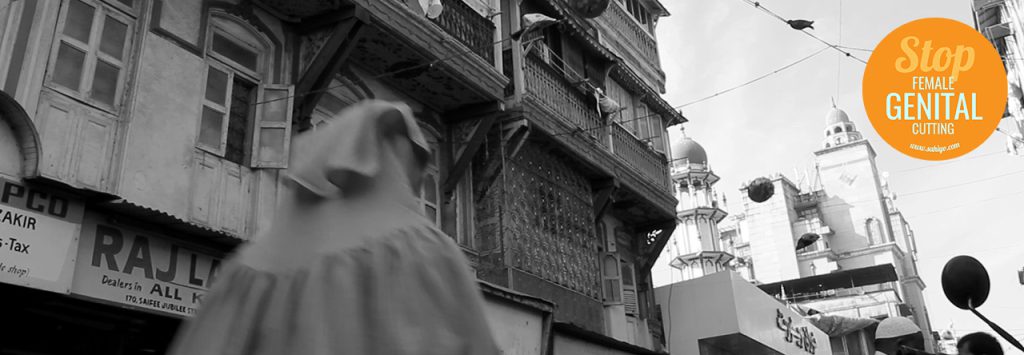
Age: 58 Country: India I was 7 years old when my grandmother told me that she is taking me out. I was so happy and dressed up quickly, expecting to be given some goodies. Instead, I was taken to the house of a strange lady who frightened me when she pinned me down. And after that, what I remember is howling, crying, acute pain, and everyone around pacifying me. The whole day passed with agony and I was afraid to pass urine because of the pain. I kept on asking my mother and grandmother about what was done to me. The only answers I got: it was for my good and I would be fine soon. However, as I grew up, I was enlightened about “Khatna” as an Islamic tradition, which was also performed on my younger brother. Later, when it was my daughter’s turn, I had to quietly go along with our religious tenets. Now, my granddaughter is 6 years old, and for her, I will not support the practice of khatna. Now I am convinced that female circumcision only results in agony and pain for a girl child, with none of the benefits it is claimed to have. Also, not all Muslim communities practice it. Moreover, I am happy that NGOs like Sahiyo have brought this issue to the forefront and are getting worldwide support.
Why this Bohra father is guilty about his daughter’s Khatna
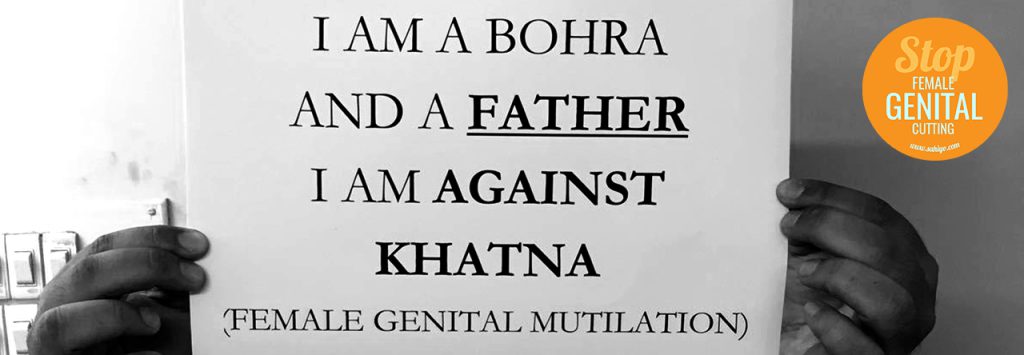
(First published on May 5, 2016) Name: Yusuf Country: India The fatwa given during the Zikra majlis by Syedna Mufaddal Saifuddin in favor of female genital cutting dug up the wound that exists in my heart which makes me write this post. Looking at parts from the audio clip leaked from the majlis, at one point, Syedna Mufaddal Saifuddin says what translates to English as: “It must be done. If it is a man, it can be done openly and if it is a woman it must be discreet. But the act must be done. Do you understand what I am saying? Let people say what they want.” The Syedna made no direct mention of the word “khatna” or “khafz”, but asks that the act be done discreetly for girls so that the community does not get tangled in any legal trouble. He cryptically says, “Do you understand what I am saying?” It was a clear reference to female genital mutilation (FGM). It is obvious that this was in response to the raging debate on FGM that has occurred in public after three Bohras were convicted in Australia for practicing khatna on two minor girls. No one from the clergy has come forward to participate in this debate, and the Syedna in his fatwa said, “We are not willing to talk to anyone on this issue”. The reason this issue dug up a wound in my heart is that a couple of years ago my daughter was made to undergo this barbaric ritual, against my wishes, under pressure from family elders and the ladies in particular. A year before my daughter turned seven, my wife told me that when our daughter turns seven we have to do her khatna. Unlike most men in the community, I was aware of what khatna or FGM is and I told her that I will not allow this. I told her this practice was started centuries ago by Bohras who wanted to curb the sexual desire of their women, as they frequently traveled for business. I told her that there is no scientific/medical basis for khatna or FGM. There is no mention of it in the Quran and that other Muslim sects do not practice it. I even told her that it is illegal in the western world and has been declared a violation of human rights by the United Nations. What I also did was initiate a discussion within my close Bohra friend group. I raised the issue as to why a girl who doesn’t understand what is going on or what’s being done to her has to go through this, especially when the ones taking her for the cut are people she trusts. One reply I received from a female friend in the group is etched in my memory. She said, “Would you want your daughter to have multiple sex partners and have extramarital affairs?” I was taken aback by the reply, particularly as this friend is a well-educated person otherwise! It left me in despair on realizing the extent of falsehoods that have been propagated within the community, with people being brainwashed into believing something as barbaric as khatna, which has no scientific basis and is a violation of human rights. Forcibly doing something that is thought to curb sexual desire is in itself a violation of human rights. If educated young women of the community think in this manner, what to say of the elders who still dominate decision-making in the majority of Bohra households? My wife agreed with me and was reluctant to put our daughter through the horror. She told my mom and her mom that I was against the decision. She was told by both that there would be no argument and that this centuries-old practice has to continue just like how they went through it. Being the only son, I live with my parents. My wife was torn between me on one side and my mother and her mother on the other. Talking to my parents did not help and ended with the usual invocation that it’s a “religious obligation”, Moula, tears, emotions, etc. My wife and I left the matter there hoping that when the time came, we could fake it. But, when my daughter turned seven, my mom said she would accompany us to take our daughter to get her khatna. She wouldn’t let us go alone. She made sure the appointment with a Bohra gynecologist (sigh!) was made. My daughter was put under the blade. The fault is mine. Maybe I wasn’t strong enough or forceful enough then to prevent that atrocity on my daughter. But, now that there is a perfidious attitude where on one hand there is this fatwa in favor of the practice, while on the other hand, jamaats in Western countries have issued letters telling citizens to refrain from the practice, I thought it is time we men from the community spoke out against it. It is time for Bohra men to be informed about this evil practice and come out against it to save their daughters. As it is well-known that the consequences of openly raising your voice against the Syedna has dire consequences, it is going to be difficult to get rid of this practice by mobilizing support from within the community. Some people may be against it, but they don’t say it openly. In my opinion, building support in the larger civil society and legal recourse is the best way to end the practice. Maybe a public interest litigation (PIL) in India will get positive result. There is already a raging debate in India over triple talaq after a lady filed a PIL against it, and it has got larger public attention and support. I commend the members of Sahiyo who are fighting against FGM. This post is my small contribution in support of their effort for a common good. ~ Written by Yusuf, a guilt-ridden and remorseful father belonging to the Dawoodi Bohra community.
‘I begged my mother not to circumcise me. She listened to me.’
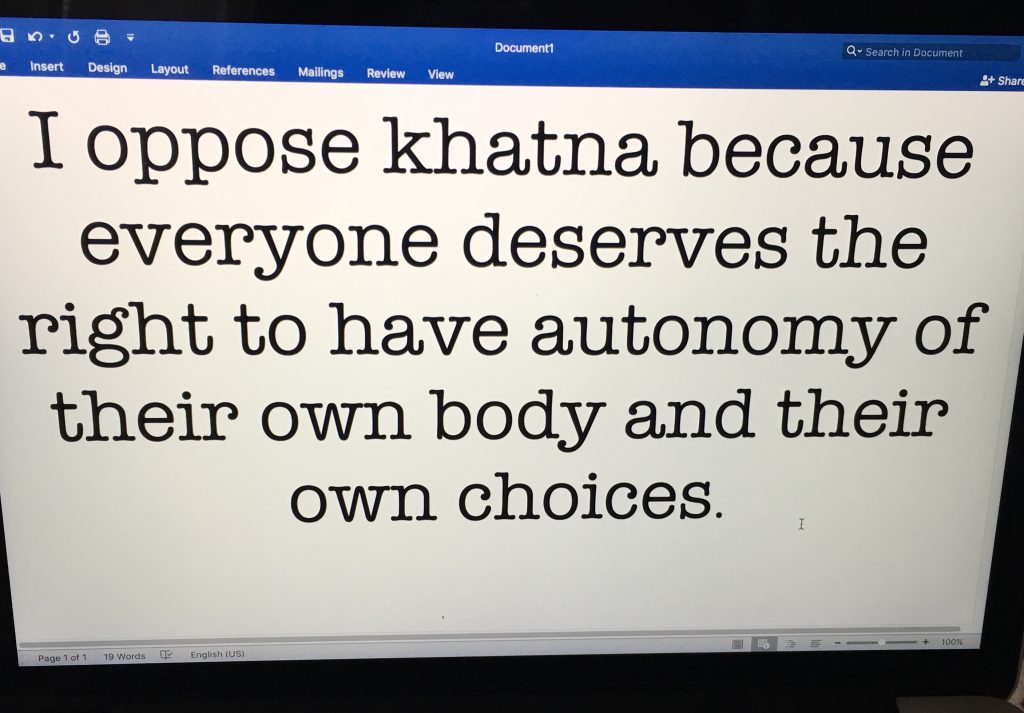
By Anonymous Age: 26 Country: United States (Read the Hindi translation of this article here.) I remember hearing about it for the first time in my Saturday school class. A male teacher was taking our class that Saturday morning, and the topic was circumcision. At the ripe age of 14, I didn’t really know what that meant, but I did know it involved something that was related to sex-ed. I awkwardly sat with the girls in my class on the right side of the room, separated from the boys by a wide space, who sat on the left side of the room. The teacher began to speak about male circumcision; that skin was surgically removed from a boy for hygienic reasons. He then went on to explain female circumcision; that it was done to curb a girl’s sexual desire. Girls were meant to be chaste, quiet, and obedient. Circumcising little girls was the only way to keep them from being promiscuous. It was the only way to stop them from bringing shame to their families. I remember sitting there, having no idea what my teacher was talking about. I was sure I had never undergone this procedure, or whatever my 14-year- old brain could comprehend from the Gujrati he was speaking – it was not my first language. I felt extremely uncomfortable and unsettled as I sat in that room that day. I remember going to a sleep-over at an older girl’s house that same Saturday, where the topic inevitably turned to what we had heard at Saturday school earlier that day. I sat quietly as one girl, a bit of a know-it-all, explained why this procedure was done on girls, and how it made us better Muslims and better Bohris – because circumcision ensured that we would never be tempted by sexual desires and pre-marital sex; it cleaned us, purified us. I listened intently as other girls relayed their circumcision stories, all the while feeling like a fraud because I knew that I had never undergone this “rite of passage”. I know now that I still didn’t understand then, what this rite of passage truly meant. All it meant to me was that I didn’t fit in, that I was a “bad girl”, that I was dirty, and that I was just pretending to be a good Muslim. I remember finally working up the courage to ask my mom about it a few weeks later. I watched awareness dawn in her eyes, as I relayed what we had learned in class. I saw the look on her face when I hopefully asked her if I had had this procedure done, and just didn’t remember. She shook her head. She had always meant to take me to get it done, when we were in India but had just never gotten around to it. I told her the stories I had heard from my friends and asked her if she could explain this procedure to me since I had had trouble understanding it in my class. She proceeded to explain the process of khatna to me; the removal of skin from a girl’s clitoris, to make her clean and pure. As I heard the explanation, I cringed. She watched me for a few minutes and then stated with authority that the next time we went to India she would take me to my aunt, a doctor, who would perform the procedure on me. I sank to my knees in front of her, begging her not to do this to me, begging her not to make me undergo what sounded like an unimaginably painful procedure. I promised her that I would be good, I would be clean, I would do anything she wanted if she would just forget this whole thing. She exhaled, saying “we’ll see” in a soft, resigned voice. I remember getting older, doing more research on what khatna even meant, listening to my cousin passionately talk about how wrong it was, and realizing what a monumental loss my mother had spared me from. As an adult, I view the practice of khatna very differently than I did as an impressionable teenager. So many young girls have had this choice stolen from them. No one has asked them if this is something that they want. Their families have decided to steal a part of who they are, without any regard for what it will do to them, and often times make the decision to bring their precious little girls to unsterile and inexperienced hands to do something so serious to their bodies. I remember seeing a huge Facebook discussion break out months ago, where a very outspoken girl I know accused people who work to stop khatna of “airing the dirty laundry” of the Bohri community in such a public way. In that moment I had never felt so much shame at someone in my community. This practice is wrong, and the non-consensual nature of it makes it even more heartbreaking and deplorable, to me. When your community is doing something questionable and touting it as a religious practice revered by the Prophet (PBUH), you don’t close ranks and hide deeper in the shadows. You open the floor to debate and discuss how we can become better as a community. You discuss how we can protect the young girls and young women of our community and give them the chance to make their own choices, rather than taking their choices away from them. We can do better as a global community to stop this. My mother saved me. She put her love for me first, and I am the woman I am today because of her. I am forever grateful for her protection and guidance. All young women deserve the same protection, the same love, the same respect, and the same autonomy over their bodies. It’s the least we can do.
The sacred self: Reflections on female circumcision by a Singaporean Malay

(Originally posted by BEYONDHIJABSG on 6 FEBRUARY, 2016. Republished here with permission.) Country: Singapore Community: Malay By: Nurul Fadiah Johari I have a memory of my little sister going through circumcision. It is all vague to me now. I was 4, and she was a baby. I only remember being brought over to the house of an old masseuse who provided my mother with post-natal care. I remember hearing my sister, who was 8 months old at the time, wailing loudly and then something was buried in a pot of soil outside my home. I had naively thought that my sister was born with a penis and had to be circumcised, just like male babies. Later, I learnt that this was not the case. In The Hidden Face of Eve, El Saadawi documents the gory and painful practices of FGM in the Arab world. This can be compared to findings from the Malay world. Though the practices here are slightly different, it is still done with the oft-quoted intent of controlling female sexuality, or the presumption that it is a religious obligation. This is ironic, given that the term sunat, in Islamic textual traditions, actually means “something that is not obligatory”. In Islam, the body is sacred. It is neither a source of temptation nor sin. It is an amanah, or trusteeship from God. It simply just means that as souls, we humans have been entrusted to honour and beautify the body. It means that any form of harm contravenes Islamic principles. Muslims celebrate beauty of creation by preserving and protecting it. Hence, as a Muslim woman, I believe that my body is sacred and thus I honour it by exercising my full agency as a human being. There are too many taboos and misunderstandings which have been perpetuated within an increasingly conservative Muslim community. Nonetheless, I choose to remain optimistic through the work I do and the voices of young Muslims (especially women) that I hear from many parts of the world. Social media has made it easier to hear the voices of women, which has traditionally been silenced. We are living in the 21st century after all. It is the age of youth and where the disempowered demand their voices be heard. One day, our collective prayers will be heard. And for that, I am thankful that changes will happen, one step at a time.
‘My mom regrets that she allowed khatna to be performed on me’
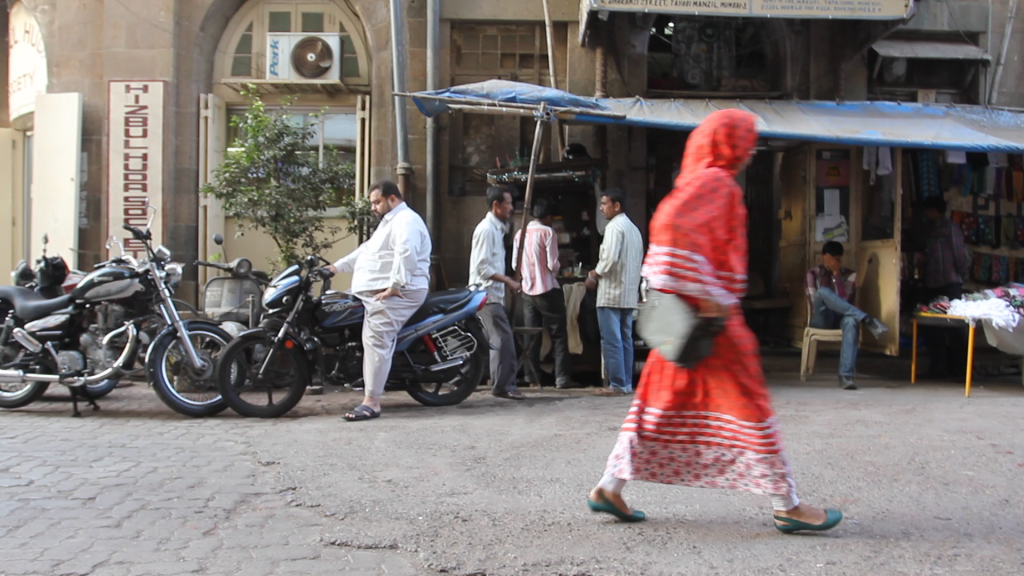
Age: 34 Country: USA I was six years old when my mom explained to me that I had to undergo the procedure of khatna – that a small surgery would happen on my private parts. I simply understood that it was one of the many rituals that I, as a Muslim girl, would experience. So one night when my parents and I were at the markaz for an event, my mom took me with her to the back room storage area where a young woman introduced herself as a doctor. The cutting happened so quickly – I do not remember any pain. I do not remember being afraid. I was given a maxi pad to wear which felt awkward. And was then asked to go into the men’s section to tell my dad we were ready to go home. While physically, I was not severely damaged, emotionally the experience of khatna has held a sobering cloud over my understanding of sexual health. The practice of khatna reinforced the idea that a woman’s sexuality is to be protected and hidden and not talked about. This is compounded by the policing of menstruating women – that we cannot touch the Qur’an or enter the Masjid while on our period. This all serves to define female genitalia as dirty things to be cut, cleaned or controlled. It took me years to unlearn this internalised oppression and find a way to practice Islam in a way that allows me to feel empowered by my sexuality instead of ashamed of it. I am also grateful that my parents are part of this journey with me and are speaking out against the practice of khatna. I know my mom especially regrets that she caved to the pressure from her parents and allowed khatna to be performed on me. I wish I could take that burden of guilt away from her. I can only hope that as she sees me in a healthy relationship with my husband now, she knows that I am OK and that we can work together to ensure the practice of genital cutting ends with my generation.
Let’s Talk About “Sunat Perempuan”

(Originally Posted by BEYONDHIJABSG on 2 FEBRUARY, 2016. Republished here with permission). Country: Singapore Community: Malay By: Afiqa Ab Rahman Recently I attended a workshop where participants from Singapore, Malaysia, India, and Thailand shared their experiences and discussed Female Genital Mutilation (FGM). Variations of the term include Female Genital Cutting (FGC) or “Sunat Perempuan”. It was intriguing to hear the experiences and research findings from various countries. But what intrigued me the most was to find that FGM was not considered a problem in some countries. The participants from Thailand, for example, shared that 100% of their women have been cut as it is seen as an identity marker of being Pattani Malay and nobody questioned it. From speaking to women, the researcher from Malaysia offered some reasons that were given on why FGM is done. She explained that some mothers thought that it was an empowering choice for the mother to decide on her daughter’s circumcision because it wasn’t the father’s or any male family members who decided. A participant from India opposed this “empowering choice” concept. What I understood from her comment was that patriarchy was to blame for having women internalise FGM as “ideas of women” and think that the choices they make for their daughters are empowering. I couldn’t agree more. In my opinion, what is empowering is accepting that your daughter has personal agency and that they can choose what to do (or not) to their bodies. What is empowering is also to have the courage to question the practice. Personally, I had been cut as a child. In fact, all the women in my family have been cut. The doctor used a sharp knife to nick my clitoral hood. And in all honesty, if I hadn’t asked my mother whether I was circumcised, I wouldn’t have known. I thought my vulva showed no signs of circumcision. When I asked my mother why she had me circumcised, she explicitly stated that it was to “decrease my libido” – the very same reason why all the women in my family have gotten circumcised. Let’s think about this – as a woman, and as a mother, does that sound right? Doesn’t nicking the clitoral hood, expose it to external stimulations? How would it “decrease the libido”? Isn’t it also very patronizing that the reason for circumcision is to prevent girls from “becoming promiscuous and going astray”? And if the purpose of circumcision is to decrease women’s libido, what is being done to decrease men’s libido? I think what we should be doing is not just accept this practice without questioning. Why is “sunat perempuan” so shameful to discuss and deemed a taboo? I think it’s about time people are open to discussing this so as to decide whether it’s really beneficial and necessary. This could save people a lot of money (from not having to pay for the procedure). And in some countries, it could save many lives too.
A Kenyan Woman’s Take on FGM/FGC in the Bohra Community
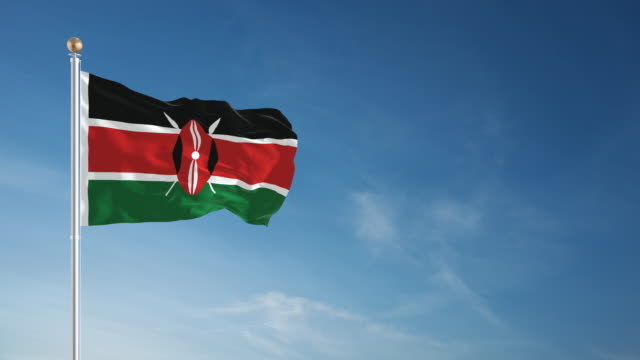
By: Zarina Patel Country of Residence: Kenya Age: 81 years I only very recently heard a fleeting mention of FGM being practiced in the Bohra Community in my country, Kenya. It was in a group conversation where I was adamantly protesting against the FGM still being inflicted on Kenyan women in spite of it being an illegal procedure in Kenyan law since 2011. It was my first time to hear the word ‘khatna’. Though I am a Bohra thankfully my late parents did not subject me to it. And so hush-hush is this ritual that my subsequent enquiries bore no fruit. But in the process, I came across SAHIYO – a windfall. FGM or FGC, extensive or minimal, is today recognized by the United Nations as a human rights violation and is one of many manifestations of gender inequality. To drag an innocent young girl child into a dark room and forcefully inflict this wound on her body; subject her to excruciating pain and most probably tell her never to speak about it as if she has committed a crime – surely this is unacceptable by any standard of human behaviour. I think any caring and ethical person will agree that it is a violation. I am interested in looking at some of the more analytical aspects of FGM in our community. First of all, I cannot help wondering why male circumcision is an event celebrated with much feasting and publicity, while its female equivalent is often done so secretively and in such isolation. The only reason I can think of is that those who perform, or arrange for, this latter act know that it is both criminal and unjustifiable and that no young girl would agree to it if asked. Male circumcision is performed to remove the foreskin of the male organ and in this day of HIV infections male circumcision has proved to be highly beneficial; even men in our Luo community (which is often referred to as the community of the uncircumcised) are embarking on it. The World Health Organization states ‘compelling evidence’ in support of this. There are no proven health benefits for FGC. Often, female circumcision is performed to reduce, if not eliminate the sexual ‘urge’. There are those who claim the opposite – that FGM enhances sexual pleasure because you are exposing the clitoris even more so, but this assertion cannot stand up to scientific reasoning. Can there be a better example of patriarchal domination and discrimination? And please note, the clitoris is one of the centres of sexual pleasure, NOT the urge which precedes the act. The urge is the result of the hormones racing through our bodies which the Almighty created. I would earnestly request my sisters, and the concerned menfolk, to give some serious thought to the practice of FGM/FGC and not to blindly follow some religious or traditional edict. After all, even in Islam directives made some 1400 years ago are being reviewed: Examples are the attainment of talak (divorce) by just three utterances (by the husband of course!) being made unlawful and the conditions for marrying four wives being made almost impossible to fulfil. And lastly do keep in mind that the practice of FGM is much older than Islam, it was already prevalent in the time of the Prophet Abraham. And it is not only Muslims who practice it; several one-time animist and now largely Christian ethnic communities also inflict this violation on their women. FGM is practiced in 30 countries in the world. One of the major propaganda tools used by our founding Kenyan president, Jomo Kenyatta, in his struggle against British colonialism was to urge his people to resist the order of the white Christian missionaries and the colonial officers for the banning of female circumcision. In those historical times the order was viewed as a form of cultural imperialism. In one of the videos available on the SAHIYO site, a woman who performs this vile act claims, when asked the purpose of this procedure, that it promotes moral behaviour. She actually states that the Bohra community has a much lower incidence of extra marital sex and adultery by women compared to other communities in India. Really? Has she carried out a survey, done the required research on this topic? Has anyone for that matter? It would certainly be a very interesting study but almost impossible in my reckoning – which woman is going to admit to a researcher (or anyone) that she is sexually ‘free’? I do hope that we are well past the age of just believing when we now have the educational tools to analyse issues and understand the processes. Is it not Islam of all religions that urges its followers to search for enlightenment even if it means traveling to the ends of the earth?
‘I am not traumatized or damaged, but I still want Khatna to stop’
